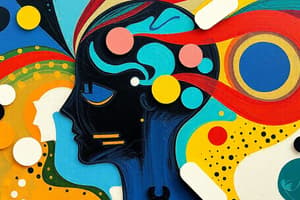Podcast
Questions and Answers
What is the term for a significant improvement of symptoms (50% reduction or more) in patients with a major depressive episode?
What is the term for a significant improvement of symptoms (50% reduction or more) in patients with a major depressive episode?
response
What is called when treatment results in the removal of essentially all symptoms of a major depressive episode for several months?
What is called when treatment results in the removal of essentially all symptoms of a major depressive episode for several months?
remission
What is the difference between relapse and recurrence in depression?
What is the difference between relapse and recurrence in depression?
Relapse occurs before full remission, while recurrence happens after recovery.
What proportion of patients with unipolar depression remit on their first treatment with a drug from this class?
What proportion of patients with unipolar depression remit on their first treatment with a drug from this class?
What are common symptoms that may persist if patients do not fully remit after treatment?
What are common symptoms that may persist if patients do not fully remit after treatment?
What happens to the relapse rate for patients who achieve remission compared to those who do not?
What happens to the relapse rate for patients who achieve remission compared to those who do not?
What is the definition of a mood stabilizer?
What is the definition of a mood stabilizer?
How have SSRIs transformed clinical psychopharmacology?
How have SSRIs transformed clinical psychopharmacology?
Flashcards are hidden until you start studying
Study Notes
Clinical Effects of Treatment in Depression
- A response to depression treatment is defined as a 50% or greater reduction in symptoms during a major depressive episode, including unipolar, bipolar, or mixed types.
- Current treatment goals focus on achieving complete remission of symptoms and preventing later relapses or recurrences.
Remission in Depression
- Remission is characterized by the removal of nearly all depression symptoms, termed recovery if sustained beyond several months.
- Patients in remission are considered well but not cured, as there is still potential for recurrence of depression.
Relapse and Recurrence in Depression
- Relapse refers to the return of depression symptoms before full remission or within months of remission.
- Recurrence involves the return of symptoms after the patient has achieved recovery.
Treatment Efficacy
- Approximately one-third of patients with unipolar depression achieve remission on their first treatment.
- After a year of varied treatments, around two-thirds of patients reach remission, but many have persisting symptoms like insomnia, fatigue, and cognitive difficulties.
- Even with successful remission, relapse rates are higher for patients requiring multiple treatments, indicating a greater risk of returning symptoms.
Proportion of Unipolar Major Depressive Episodes Relapse
- Relapse rates can vary from 60% to 70% for patients who do not achieve remission after one to four treatments.
- For patients who do manage to remit, relapse rates range from 33% to 70%, diminishing the protective nature of remission with increased treatment attempts.
Mood Stabilizer
- Initially defined as a drug to treat mania and prevent its recurrence, mood stabilizers now encompass a broader range of medications used for bipolar disorder.
- These might include lithium, anticonvulsants, or antipsychotics, which stabilize both mania and depression phases of the disorder.
Drugs for Unipolar Depressions
- SSRIs represent a significant advancement in psychopharmacology, with estimates of 7 prescriptions per second in the U.S., totaling over 225 million annually.
- SSRIs are now prescribed for a range of conditions beyond unipolar major depressive disorder, reflecting their wide clinical application.
Studying That Suits You
Use AI to generate personalized quizzes and flashcards to suit your learning preferences.


